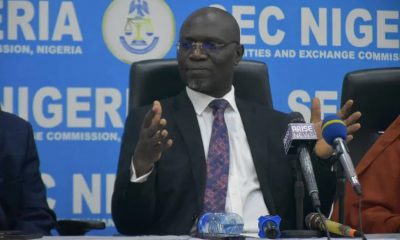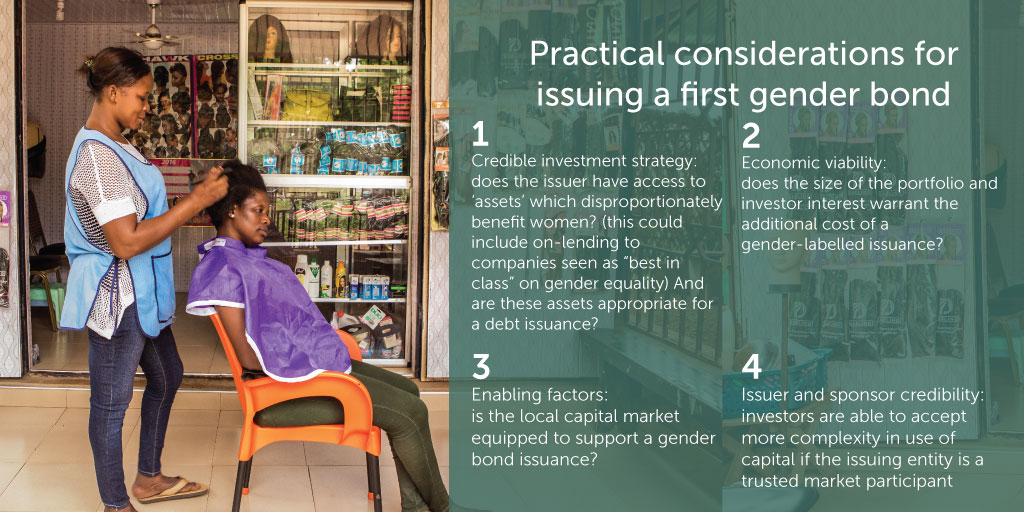Economy
Moody’s Assigns GB1 to Nigeria’s Green Bonds

By Modupe Gbadeyanka
Nigeria’s senior unsecured green notes have been assigned a Green Bond Assessment of GB1 (Excellent) by Moody’s Investors Service.
A statement issued by the rating agency disclosed that the GB1 grade is supported by a full allocation of proceeds to renewable energy and afforestation projects that qualify under Nigeria’s domestic green bond guidelines and international green bond taxonomies, including the Green Bond Principles and Climate Bond Initiative’s (CBI) Climate Bond Standard.
On December 18, 2017, Nigeria will launch the Series 1 green bond of 10.69 billion, with precise coupons and maturities to be determined at the time of closing.
The green notes will represent the Nigerian government’s debut offering under its N150 billion green bond program and is expected to be listed on the Nigerian Stock Exchange (NSE). It will also mark the first sovereign green bond issuance in Africa, and the fourth on record globally.
Nigeria is the largest economy is Africa, generating a gross domestic product of $405.9 billion, in nominal terms, last year.
The country is also the continent’s most populous, with an estimated population of over 180 million and has been actively engaged in international climate policy negotiations since it became a Party to the United Nations Convention on Climate Change in 1994, and is a signatory to the Paris Agreement on Climate Change.
“In preparation for Africa’s maiden sovereign green bond, the Government of Nigeria has put in place a comprehensive governance structure and framework that is aligned with the country’s domestic green bond guidelines and international best practices,” says Rahul Ghosh, a Moody’s Senior Vice President.
“Robust disclosure practices, including expectations of ongoing and granular reporting over the life of the bond, will facilitate the implementation of Nigeria’s Paris Agreement commitments,” adds Charles Berckmann, Assistant Vice President and lead analyst in Moody’s Green Bond Assessment team.
Moody’s said further bolstering the GB1 grade is the government’s comprehensive organization and governance structure, which includes a formal green bond framework and explicit guidelines on eligible categories, project evaluation and selection criteria, and oversight from internal bodies and external organizations.
To support the green bond initiative, the government has set up a Green Bond Private Public Sector Advisory that is comprised of external development partners, independent regulators, capital market operators and relevant ministries.
The development partners include the World Bank, International Finance Corporation, African Development Bank, the United Nations Environment Program (UNEP) and the CBI.
The disclosure on use of proceeds practices are robust overall, providing a strong level of detail on project descriptions, applied methodologies, and intended benefits. The government has provided portfolio-level technical reports for each of the three programs that will be financed with the green bond proceeds.
Each report contains comprehensive program descriptions, assessments of the environmental, financial and economic impacts and an evaluation of safeguards and social implications. The funding in place to complete the projects appears adequate, despite the government’s weak fiscal position and recent track record of enacting significant capital expenditure cuts.
The Nigerian authorities have adopted a clear internal process and formal set of administrative policies designed to manage the segregation and tracking of green bond proceeds. This includes the creation of a centralized Green Bonds Proceeds Account held at the Central Bank of Nigeria, and individual sub-accounts for specific environmental projects. Any unallocated proceeds will be held in accordance with the government’s normal liquidity management policy, which comprises of investments in cash, short-term deposits and other short-term liquidity instruments. One area of slight weakness is the lack of an unequivocally independent internal audit of the centralized and sub-accounts.
The government has committed to bi-annual reporting, initially within one year of the issuance and subsequently until full allocation of the proceeds.
Furthermore, it has signalled its intention to provide ongoing disclosure over the life of the bond, and potentially afterwards given that green project metrics will be used to track the annual performance of Nigeria’s nationally determined contribution (NDC) under the Paris Agreement, which runs until 2030.
While the NDC targets will be reported on an aggregated basis, the authorities have indicated that reporting on the green bonds will be provided at a project level. The government has also indicated that the annual reports will be segregated by the relevant green bond and, as such, subsequent issuances would be covered in separate annual reporting.
Economy
Nigeria’s Economy Expands 4.07% in Q4 2025

By Adedapo Adesanya
Nigeria’s economy, measured by gross domestic product (GDP), grew by 4.07 per cent (year-on-year) in real terms in the fourth quarter (Q4) of 2025.
The National Bureau of Statistics (NBS) announced the development in its latest GDP report for Q4 2025 on Friday.
The latest figure represents an improvement over the 3.76 per cent growth recorded in the corresponding period of 2024, signalling sustained recovery across key sectors of the economy. The growth rate was faster than the third quarter’s 3.98 per cent.
The report confirmed that Nigeria’s oil sector grew 6.79 per cent year-on-year and the non-oil part of the economy expanded by 3.99 per cent.
Nigeria’s average daily oil production stood at 1.58 million barrels per day in the final three months of 2025. That was lower than the third quarter’s output of 1.64 million barrels per day but higher than the 1.54 million barrels per day in the fourth quarter of 2024.
Breakdown of the data showed that the agriculture sector grew by 4.00 per cent in the fourth quarter of 2025. This marks a significant increase compared to the 2.54 per cent growth recorded in the same quarter of 2024, reflecting improved output and resilience in the sector.
The industry sector also recorded a stronger performance during the period under review. It grew by 3.88 per cent year-on-year, up from 2.49 per cent posted in the fourth quarter of 2024. The improvement suggests enhanced activity in manufacturing, construction, and related industrial sub-sectors.
The services sector maintained its position as a major growth driver, expanding by 4.15 per cent in Q4 2025. However, this was slightly lower than the 4.75 per cent growth recorded in the corresponding quarter of the previous year.
Overall, the 4.07 per cent GDP growth in the final quarter of 2025 underscores broad-based expansion across agriculture, industry, and services, despite a marginal moderation in services growth.
The Q4 performance provides further evidence of strengthening economic momentum, with improvements recorded in both agriculture and industry compared to the previous year.
Economy
Flour Mills Supports 2026 Paris International Agricultural Show

By Modupe Gbadeyanka
For the second time, Flour Mills of Nigeria Plc is sponsoring the Paris International Agricultural Show (PIAS) as part of its strategies to fortify its ties with France.
The 2026 PIAS kicked off on February 21 and will end on March 1, with about 607,503 visitors, nearly 4,000 animals, and over 1,000 exhibitors in attendance last year, and this year’s programme has already shown signs of being bigger and better.
The theme for this year’s event is Generations Solution. It is to foster knowledge transfer from younger generations and structure processes through which knowledge can be harnessed to drive technological advancement within the global agricultural sector.
In his address on the inaugural day of the Nigerian Pavilion on February 23, the Managing Director for FMN Agro and Director of Strategic Engagement/Stakeholder Relations, Mr Sadiq Usman, said, “At FMN, our mission is Feeding and Enriching Lives Every Day.
“This is a mandate we have fulfilled through decades of economic shifts, rooted in a culture of deep resilience and constant innovation. We support this pavilion because FMN recognises that the next frontier of global Agribusiness lies in high-level technical exchange.
“We thank the France-Nigeria Business Council (FNBC), the organisers of the PIAS, and our fellow members of the Nigerian Pavilion – Dangote, BUA, Zenith, Access, and our partners at Creativo El Matador and Soilless Farm Lab— we are exceedingly pleased to work to showcase the true face of Nigerian commerce.”
Speaking on the invaluable nature of the relationship between Nigeria and France, and the FMN’s commitment to process and product innovation, Mr John G. Coumantaros, stated, “The France – Nigeria relationship is a valuable partnership built on a shared value agenda that fosters remarkable Intercontinental trade growth.
“Also, as an organisation with over six decades of transformational footprint in Nigeria and progressively across the African Continent, FMN has been unwaveringly committed to product and process innovation.
“Therefore, our continuous partnership with France for the success of the Paris International Agricultural Show further buttresses the thriving relationship between both countries.”
PIAS is one of the most widely attended agricultural shows, with thousands of people from across the world in attendance.
Economy
NEITI Backs Tinubu’s Executive Order 9 on Oil Revenue Remittances

By Adedapo Adesanya
Despite reservations from some quarters, the Nigeria Extractive Industries Transparency Initiative (NEITI) has praised President Bola Tinubu’s Executive Order 9, which mandates direct remittances of all government revenues from tax oil, profit oil, profit gas, and royalty oil under Production Sharing Contracts, profit sharing, and risk service contracts straight to the Federation Account.
Issued on February 13, 2026, the order aims to safeguard oil and gas revenues, curb wasteful spending, and eliminate leakages by requiring operators to pay all entitlements directly into the federation account.
NEITI executive secretary, Musa Sarkin Adar, called it “a bold step in ongoing fiscal reforms to improve financial transparency, strengthen accountability, and mobilise resources for citizens’ development,” noting that the directive aligns with Section 162 of Nigeria’s Constitution.
He noted that for 20 years, NEITI has pushed for all government revenues to flow into the Federation Account transparently, calling the move a win.
For instance, in its 2017 report titled Unremitted Funds, Economic Recovery and Oil Sector Reform, NEITI revealed that over $20 billion in due remittances had not reached the government, fueling fiscal woes and prompting high-level reforms.
Mr Adar described the order as a key milestone in Nigeria’s EITI implementation and urged amendments to align it with these reforms.
He affirmed NEITI’s role in the Petroleum Industry Act (PIA) and pledged close collaboration with stakeholders, anti-corruption bodies, and partners to sustain transparent management of Nigeria’s mineral resources.
Meanwhile, others like the Petroleum and Natural Gas Senior Staff Association of Nigeria (PENGASSAN) have kicked against the order, saying it poses a serious threat to the stability of the oil and gas industry, calling it a “direct attack” on the PIA.
Speaking at the union’s National Executive Council (NEC) meeting in Abuja on Tuesday, PENGASSAN President, Mr Festus Osifo, said provisions of the order, particularly the directive to remit 30 per cent of profit oil from Production Sharing Contracts (PSCs) directly to the Federation Account, could destabilise operations at the Nigerian National Petroleum Company (NNPC) Limited.
Mr Osifo firmly dispelled rumours of imminent protests by the union, despite widespread claims that the controversial executive order threatens the livelihoods of 10,000 senior staff workers at NNPC.
He noted, however, that the union had begun engagements with government officials, including the Presidential Implementation Committee, and expressed optimism that common ground would be reached.
Mr Osifo, who also serves as President of the Trade Union Congress (TUC), expressed concerns that diverting the 30 per cent profit oil allocation to the Federation Account Allocation Committee (FAAC), without clearly defining how the statutory management fee would be refunded to NNPC, could affect the salaries of hundreds of PENGASSAN members.
-

 Feature/OPED6 years ago
Feature/OPED6 years agoDavos was Different this year
-
Travel/Tourism10 years ago
Lagos Seals Western Lodge Hotel In Ikorodu
-

 Showbiz3 years ago
Showbiz3 years agoEstranged Lover Releases Videos of Empress Njamah Bathing
-

 Banking8 years ago
Banking8 years agoSort Codes of GTBank Branches in Nigeria
-

 Economy3 years ago
Economy3 years agoSubsidy Removal: CNG at N130 Per Litre Cheaper Than Petrol—IPMAN
-

 Banking3 years ago
Banking3 years agoSort Codes of UBA Branches in Nigeria
-

 Banking3 years ago
Banking3 years agoFirst Bank Announces Planned Downtime
-

 Sports3 years ago
Sports3 years agoHighest Paid Nigerian Footballer – How Much Do Nigerian Footballers Earn



















